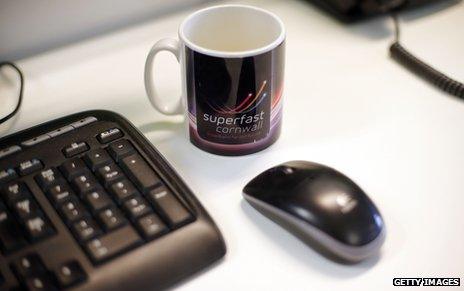The long wait for rural broadband
- Published
- comments

Loading... waiting...
An exciting press release landed in my inbox this week: "Superfast Broadband One Step Closer For Thousands More Hertfordshire and Buckinghamshire Homes and Businesses." This new technology could do for Buckinghamshire "what the railways did for the Victorians", promised the council leader quoted within.
The two counties are the latest to announce how they'll spend their share of the £530m superfast rural broadband fund that the government announced back in 2010.
But behind the excitable press release, there's growing dismay about the whole process of delivering fast broadband to rural areas, with the word "shambles" making a frequent appearance. People in areas promised a share of the superfast future are growing impatient with the lack of progress.
Peter Green, who lives in the community of Eggesford in Devon, is typical.
He got in touch to tell me of the frustrations of trying to run a holiday cottage business on a 500Kbps broadband connection - "We tried to upload videos but it was pointless" - and his fruitless efforts to find out just when the Connecting Devon and Somerset organisation might take his village into the 21st Century. A contract with BT was signed earlier this year, but he's still no clearer as to when or if that will help him.
Here's the charge sheet against the government's efforts:
Promises about timetables for delivering faster connections have not been met
A process supposed to deliver competition now looks certain to end up with one company, BT, scooping up the entire cash pile
The whole process has been a bureaucratic and costly nightmare that has annoyed everyone involved.
You can see why rural broadband campaigners might be confused about the government's timetable. Back in 2009, the Labour government promised that everyone would get a minimum 2Mbps by 2012. But when the coalition government arrived, Culture Secretary Jeremy Hunt said that wasn't good enough.
He scrapped the 2012 target, and instead promised that Britain would have the best superfast broadband network in Europe - by 2015. What the market could not deliver - the final third of the country - would be hooked up thanks to that £530m fund from the licence fee, to be administered by a body called BDUK.
But, as Mr Green in Devon and many others elsewhere have found, that timetable has now slipped. The process of putting each county's service out to tender has been painfully slow - 16 out of the 41 designated areas have yet to appoint a contractor - and many of the projects won't be completed until 2016.
Whose fault is this? BDUK? The councils? BT? They all point the finger at the EU for investigating whether the government cash constituted state aid, but you might ask whether that could not have been foreseen.
There also seems to have been far too much complexity in the bidding process. When I contacted Keri Denton, the Devon County Council executive who runs Connecting Devon and Somerset, external, she insisted that everything was now on schedule since the contract with BT was signed in January. Work on planning the rollout was in full swing, examining every duct, lifting every manhole, to calculate how far the fast network would stretch.
I wasn't clear why some of that work could not have begun back in 2010 when the government funding was first announced, but she insisted that wasn't possible while the procurement process was ongoing. "We would share that frustration," she said when I told her how painful it all looked to those waiting for the network. But she maintained that the end result would be a "damned good deal" for the councils, and for residents.

BT, not surprisingly, agrees with that. The company insists that Britain is still on track to hit that 2015 target of the best superfast broadband in Europe - even if many of the rural projects won't be complete by then. Bill Murphy, the man running the operation, says there were other firms competing for some of the contracts in the early stages but "they all found it very difficult to make a case".
When I put it to him that it might have been better and faster to have central government just hand the whole thing to BT from the start, with tight regulation, he disagreed. "It is a long process, it does cost money to procure things locally, but the fact of the matter is that the only way you're going to get local buy-in is to do it locally."
It is the Department of Culture, Media and Sport which is getting most of the blame. It always looked strange that a department with little experience in this field should be in charge of such a major infrastructure project. Now it seems the Treasury agrees - a report on government infrastructure projects by the Commercial Secretary Lord Deighton is thought to be critical of BDUK, recommending a shake-up.
Even Maria Miller, the current Culture Secretary, seems keen to distance herself from the work of her predecessor in this area. I understand that she feels now is the time, as the procurement process nears its conclusion, to bring in some more commercial expertise to BDUK, rather than leaving the civil servants in charge.
In the meantime, Mr Green is still waiting to hear when his village will move out of the slow lane. "We've been waiting years to get anything more than 500k and there's a total lack of information." He points out that council taxpayers are also contributing to the scheme to the tune of more than £20m. "It's a lot of money locally and we should be seeing something from it. We hear that broadband speeds are going up nationally but that's in the towns. In the rural areas we are stuck where we are."
Later this week there should be more news, both nationally and locally, on the progress of the superfast broadband project. But that ambition of showing the rest of Europe how to do it by 2015 now looks more challenging than ever.